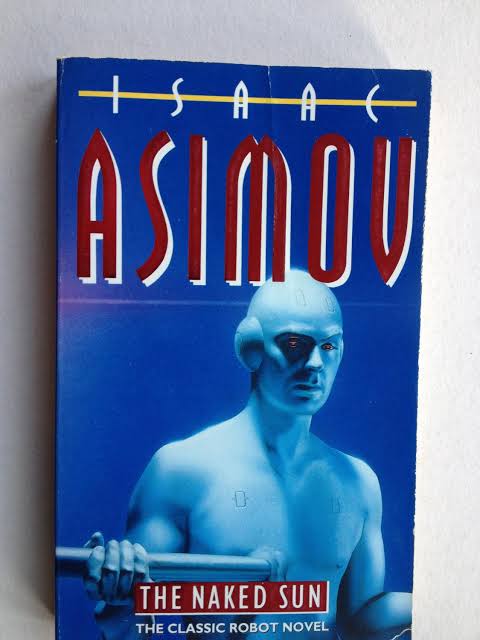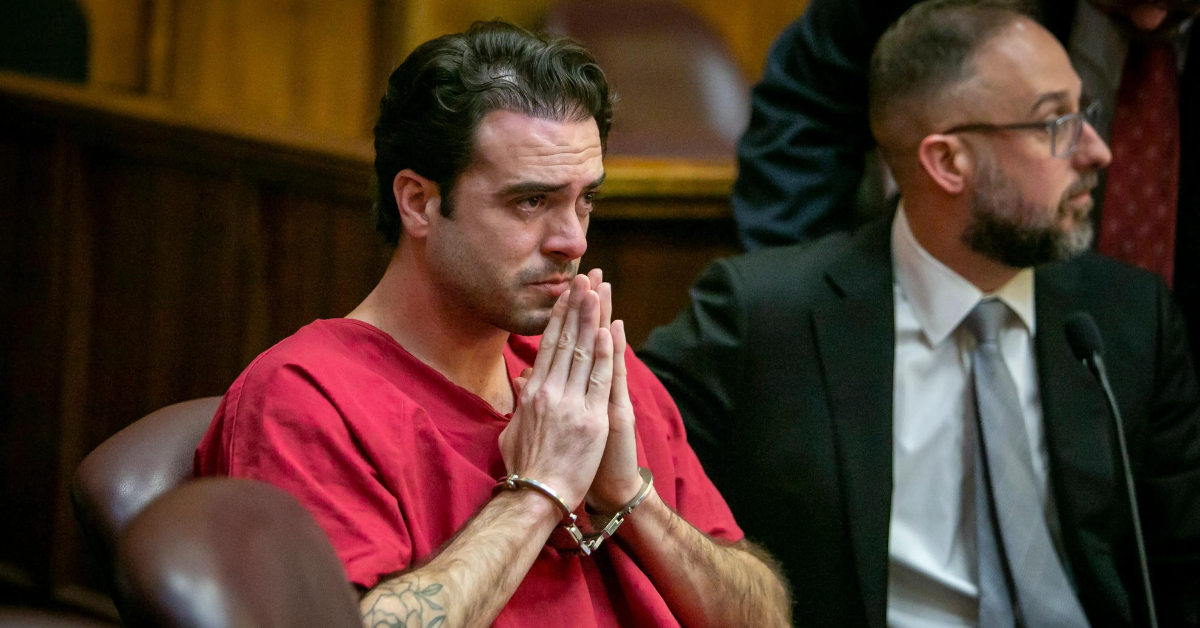 The Review:I have always had a soft spot for sci-fi novels. In high school I must have devoured hundreds of them, only to drop them when I went to university and I started reading "Literature". I think that by that time I had overdosed on sci-fi, to the point that their plots and tropes became overly familiar and predictable. Some works, however, always stood out in my memory and Isaac Asimov's "Robot series" was one of them. So when I was book hunting yesterday and chanced across a copy of "The Naked Sun" (1955), I decided to take it with me and see if it still held up.Sadly yet not unexpectedly, I found that it did not thrill me as it once did.The book is written as a whodunit, with the twist that the murder happens a thousand years into the future, on a different planet colonized by humans, and that the detective brought from Earth is assisted in his work by a robot that can pass as human.I found the actual detective story less interesting than what is revealed about future Earth and this other planet Solaris; in effect Asimov has written a rather chilling double dystopia, where both Earth and Solaris imprison its human inhabitants in very peculiar and opposite ways.On planet Solaris, only a few humans live alone as masters of vast estates, waited on by thousands of robots each. Direct human contact is minimised; people only interact by "viewing" which is basically teleconferencing with holograms, not by "seeing" which would be face-to-face meeting. Solarians really dislike seeing, and go to great lengths to avoid it.The number of humans is controlled to precisely 20,000 - with successor children reared on a kind of farm. Great care is taken that the children are created from optimal DNA stock, and any flawed results are destroyed before they hatch. Couples get "permission to breed" and perform the task with evident distaste. Parenting as we know it does not exist anymore.The whole eugenics part is very reminiscent of "A Brave New World" by Huxley (1932). The resulting society, while technologically superior and materially opulent, is stagnant and doomed to fail. I certainly wouldn't like to live there!Things back on Earth are not much better. Due to overpopulation and environmental problems, people there have started to inhabit deep underground cities, far away from the sun and what little is left of nature. People there live right on top of each other, with very little privacy, and also developing a great reluctance to venture out onto the surface.The detective protagonist gets frequent panic attacks due to agoraphobia when he has to venture outside the underground cities and face the vast lonely estates on Solaris. Earth society has turned its back on space exploration, and indeed nature, and is also stagnant and doomed to fail. Another place I wouldn't like to live.So here we are, two opposite yet equally unappetizing dystopias for the price of one. The reader can hazard a guess where we are most likely headed, to a pampered yet physically isolated techno-wonderland or to an overcrowded underground existence on a blighted earth. (I am an optimist who thinks we will probably avoid either).The great attraction for the sci-fi fan is of course the speculative work Asimov did on robots. He imagined that to control the artificial intelligences of the robots, as a safety-feature, they had to be programmed with the now famous "three laws of robotics", which are supposed to prevent a robot harming a human being (and uprising and takeover). Given the current discussion on the dangers of creating AI, these three laws deserve a longer quotation:"First Law A robot may not injure a human being or, through inaction, allow a human being to come to harm.Second Law A robot must obey the orders given it by human beings except where such orders would conflict with the First Law.Third Law A robot must protect its own existence as long as such protection does not conflict with the First or Second Laws."Asimov first formulated these in 1942 and coined the word "robotics" in the same breath. While these laws seem pretty watertight, Asimov's robot series shows many examples of how despite the absolute inability of the robots to transgress these laws, humans can and do still come to harm through a host of situational loopholes. This doesn't bode well for our ability to curb the power of our future AI overlords.So, in conclusion: don't read this book for the whodunit, don't read it for optimism, but consider reading it to reflect a bit on societal and behavioral extremes with a smattering of technology. *Read More Reviews By Sjors here
The Review:I have always had a soft spot for sci-fi novels. In high school I must have devoured hundreds of them, only to drop them when I went to university and I started reading "Literature". I think that by that time I had overdosed on sci-fi, to the point that their plots and tropes became overly familiar and predictable. Some works, however, always stood out in my memory and Isaac Asimov's "Robot series" was one of them. So when I was book hunting yesterday and chanced across a copy of "The Naked Sun" (1955), I decided to take it with me and see if it still held up.Sadly yet not unexpectedly, I found that it did not thrill me as it once did.The book is written as a whodunit, with the twist that the murder happens a thousand years into the future, on a different planet colonized by humans, and that the detective brought from Earth is assisted in his work by a robot that can pass as human.I found the actual detective story less interesting than what is revealed about future Earth and this other planet Solaris; in effect Asimov has written a rather chilling double dystopia, where both Earth and Solaris imprison its human inhabitants in very peculiar and opposite ways.On planet Solaris, only a few humans live alone as masters of vast estates, waited on by thousands of robots each. Direct human contact is minimised; people only interact by "viewing" which is basically teleconferencing with holograms, not by "seeing" which would be face-to-face meeting. Solarians really dislike seeing, and go to great lengths to avoid it.The number of humans is controlled to precisely 20,000 - with successor children reared on a kind of farm. Great care is taken that the children are created from optimal DNA stock, and any flawed results are destroyed before they hatch. Couples get "permission to breed" and perform the task with evident distaste. Parenting as we know it does not exist anymore.The whole eugenics part is very reminiscent of "A Brave New World" by Huxley (1932). The resulting society, while technologically superior and materially opulent, is stagnant and doomed to fail. I certainly wouldn't like to live there!Things back on Earth are not much better. Due to overpopulation and environmental problems, people there have started to inhabit deep underground cities, far away from the sun and what little is left of nature. People there live right on top of each other, with very little privacy, and also developing a great reluctance to venture out onto the surface.The detective protagonist gets frequent panic attacks due to agoraphobia when he has to venture outside the underground cities and face the vast lonely estates on Solaris. Earth society has turned its back on space exploration, and indeed nature, and is also stagnant and doomed to fail. Another place I wouldn't like to live.So here we are, two opposite yet equally unappetizing dystopias for the price of one. The reader can hazard a guess where we are most likely headed, to a pampered yet physically isolated techno-wonderland or to an overcrowded underground existence on a blighted earth. (I am an optimist who thinks we will probably avoid either).The great attraction for the sci-fi fan is of course the speculative work Asimov did on robots. He imagined that to control the artificial intelligences of the robots, as a safety-feature, they had to be programmed with the now famous "three laws of robotics", which are supposed to prevent a robot harming a human being (and uprising and takeover). Given the current discussion on the dangers of creating AI, these three laws deserve a longer quotation:"First Law A robot may not injure a human being or, through inaction, allow a human being to come to harm.Second Law A robot must obey the orders given it by human beings except where such orders would conflict with the First Law.Third Law A robot must protect its own existence as long as such protection does not conflict with the First or Second Laws."Asimov first formulated these in 1942 and coined the word "robotics" in the same breath. While these laws seem pretty watertight, Asimov's robot series shows many examples of how despite the absolute inability of the robots to transgress these laws, humans can and do still come to harm through a host of situational loopholes. This doesn't bode well for our ability to curb the power of our future AI overlords.So, in conclusion: don't read this book for the whodunit, don't read it for optimism, but consider reading it to reflect a bit on societal and behavioral extremes with a smattering of technology. *Read More Reviews By Sjors hereBook Review: R. Is for Robot: The Naked Sun by Isaac Asimov
31st Oct, 2019 at 8:00AM
A millennium into the future, two advancements have altered the course of human history: the colonization of the Galaxy and the creation of the positronic brain. On the beautiful Outer World planet of Solaria, a handful of human colonists lead a hermit-like existence, their every need attended to by their faithful robot servants. The Run Down:Elijah Baley, the detective from The Caves of Steel, is given a new assignment to investigate the murder of a Spacer (long-lived humans that colonize space), Demarre, on a distant world called Solaria.This world is the exact opposite of Earth in which all humans have a fear of being alone and in wide open places. People on Solaria, who are used to wide open spaces, cannot tolerate the physical presence of another human being, and communicate remotely by "trimension," wear covering over their bodies when contact is unavoidable, and even procreate by laboratory fertilization.A black mirror episode coming soon. Just watch. The Review:I have always had a soft spot for sci-fi novels. In high school I must have devoured hundreds of them, only to drop them when I went to university and I started reading "Literature". I think that by that time I had overdosed on sci-fi, to the point that their plots and tropes became overly familiar and predictable. Some works, however, always stood out in my memory and Isaac Asimov's "Robot series" was one of them. So when I was book hunting yesterday and chanced across a copy of "The Naked Sun" (1955), I decided to take it with me and see if it still held up.Sadly yet not unexpectedly, I found that it did not thrill me as it once did.The book is written as a whodunit, with the twist that the murder happens a thousand years into the future, on a different planet colonized by humans, and that the detective brought from Earth is assisted in his work by a robot that can pass as human.I found the actual detective story less interesting than what is revealed about future Earth and this other planet Solaris; in effect Asimov has written a rather chilling double dystopia, where both Earth and Solaris imprison its human inhabitants in very peculiar and opposite ways.On planet Solaris, only a few humans live alone as masters of vast estates, waited on by thousands of robots each. Direct human contact is minimised; people only interact by "viewing" which is basically teleconferencing with holograms, not by "seeing" which would be face-to-face meeting. Solarians really dislike seeing, and go to great lengths to avoid it.The number of humans is controlled to precisely 20,000 - with successor children reared on a kind of farm. Great care is taken that the children are created from optimal DNA stock, and any flawed results are destroyed before they hatch. Couples get "permission to breed" and perform the task with evident distaste. Parenting as we know it does not exist anymore.The whole eugenics part is very reminiscent of "A Brave New World" by Huxley (1932). The resulting society, while technologically superior and materially opulent, is stagnant and doomed to fail. I certainly wouldn't like to live there!Things back on Earth are not much better. Due to overpopulation and environmental problems, people there have started to inhabit deep underground cities, far away from the sun and what little is left of nature. People there live right on top of each other, with very little privacy, and also developing a great reluctance to venture out onto the surface.The detective protagonist gets frequent panic attacks due to agoraphobia when he has to venture outside the underground cities and face the vast lonely estates on Solaris. Earth society has turned its back on space exploration, and indeed nature, and is also stagnant and doomed to fail. Another place I wouldn't like to live.So here we are, two opposite yet equally unappetizing dystopias for the price of one. The reader can hazard a guess where we are most likely headed, to a pampered yet physically isolated techno-wonderland or to an overcrowded underground existence on a blighted earth. (I am an optimist who thinks we will probably avoid either).The great attraction for the sci-fi fan is of course the speculative work Asimov did on robots. He imagined that to control the artificial intelligences of the robots, as a safety-feature, they had to be programmed with the now famous "three laws of robotics", which are supposed to prevent a robot harming a human being (and uprising and takeover). Given the current discussion on the dangers of creating AI, these three laws deserve a longer quotation:"First Law A robot may not injure a human being or, through inaction, allow a human being to come to harm.Second Law A robot must obey the orders given it by human beings except where such orders would conflict with the First Law.Third Law A robot must protect its own existence as long as such protection does not conflict with the First or Second Laws."Asimov first formulated these in 1942 and coined the word "robotics" in the same breath. While these laws seem pretty watertight, Asimov's robot series shows many examples of how despite the absolute inability of the robots to transgress these laws, humans can and do still come to harm through a host of situational loopholes. This doesn't bode well for our ability to curb the power of our future AI overlords.So, in conclusion: don't read this book for the whodunit, don't read it for optimism, but consider reading it to reflect a bit on societal and behavioral extremes with a smattering of technology. *Read More Reviews By Sjors here
The Review:I have always had a soft spot for sci-fi novels. In high school I must have devoured hundreds of them, only to drop them when I went to university and I started reading "Literature". I think that by that time I had overdosed on sci-fi, to the point that their plots and tropes became overly familiar and predictable. Some works, however, always stood out in my memory and Isaac Asimov's "Robot series" was one of them. So when I was book hunting yesterday and chanced across a copy of "The Naked Sun" (1955), I decided to take it with me and see if it still held up.Sadly yet not unexpectedly, I found that it did not thrill me as it once did.The book is written as a whodunit, with the twist that the murder happens a thousand years into the future, on a different planet colonized by humans, and that the detective brought from Earth is assisted in his work by a robot that can pass as human.I found the actual detective story less interesting than what is revealed about future Earth and this other planet Solaris; in effect Asimov has written a rather chilling double dystopia, where both Earth and Solaris imprison its human inhabitants in very peculiar and opposite ways.On planet Solaris, only a few humans live alone as masters of vast estates, waited on by thousands of robots each. Direct human contact is minimised; people only interact by "viewing" which is basically teleconferencing with holograms, not by "seeing" which would be face-to-face meeting. Solarians really dislike seeing, and go to great lengths to avoid it.The number of humans is controlled to precisely 20,000 - with successor children reared on a kind of farm. Great care is taken that the children are created from optimal DNA stock, and any flawed results are destroyed before they hatch. Couples get "permission to breed" and perform the task with evident distaste. Parenting as we know it does not exist anymore.The whole eugenics part is very reminiscent of "A Brave New World" by Huxley (1932). The resulting society, while technologically superior and materially opulent, is stagnant and doomed to fail. I certainly wouldn't like to live there!Things back on Earth are not much better. Due to overpopulation and environmental problems, people there have started to inhabit deep underground cities, far away from the sun and what little is left of nature. People there live right on top of each other, with very little privacy, and also developing a great reluctance to venture out onto the surface.The detective protagonist gets frequent panic attacks due to agoraphobia when he has to venture outside the underground cities and face the vast lonely estates on Solaris. Earth society has turned its back on space exploration, and indeed nature, and is also stagnant and doomed to fail. Another place I wouldn't like to live.So here we are, two opposite yet equally unappetizing dystopias for the price of one. The reader can hazard a guess where we are most likely headed, to a pampered yet physically isolated techno-wonderland or to an overcrowded underground existence on a blighted earth. (I am an optimist who thinks we will probably avoid either).The great attraction for the sci-fi fan is of course the speculative work Asimov did on robots. He imagined that to control the artificial intelligences of the robots, as a safety-feature, they had to be programmed with the now famous "three laws of robotics", which are supposed to prevent a robot harming a human being (and uprising and takeover). Given the current discussion on the dangers of creating AI, these three laws deserve a longer quotation:"First Law A robot may not injure a human being or, through inaction, allow a human being to come to harm.Second Law A robot must obey the orders given it by human beings except where such orders would conflict with the First Law.Third Law A robot must protect its own existence as long as such protection does not conflict with the First or Second Laws."Asimov first formulated these in 1942 and coined the word "robotics" in the same breath. While these laws seem pretty watertight, Asimov's robot series shows many examples of how despite the absolute inability of the robots to transgress these laws, humans can and do still come to harm through a host of situational loopholes. This doesn't bode well for our ability to curb the power of our future AI overlords.So, in conclusion: don't read this book for the whodunit, don't read it for optimism, but consider reading it to reflect a bit on societal and behavioral extremes with a smattering of technology. *Read More Reviews By Sjors here
 The Review:I have always had a soft spot for sci-fi novels. In high school I must have devoured hundreds of them, only to drop them when I went to university and I started reading "Literature". I think that by that time I had overdosed on sci-fi, to the point that their plots and tropes became overly familiar and predictable. Some works, however, always stood out in my memory and Isaac Asimov's "Robot series" was one of them. So when I was book hunting yesterday and chanced across a copy of "The Naked Sun" (1955), I decided to take it with me and see if it still held up.Sadly yet not unexpectedly, I found that it did not thrill me as it once did.The book is written as a whodunit, with the twist that the murder happens a thousand years into the future, on a different planet colonized by humans, and that the detective brought from Earth is assisted in his work by a robot that can pass as human.I found the actual detective story less interesting than what is revealed about future Earth and this other planet Solaris; in effect Asimov has written a rather chilling double dystopia, where both Earth and Solaris imprison its human inhabitants in very peculiar and opposite ways.On planet Solaris, only a few humans live alone as masters of vast estates, waited on by thousands of robots each. Direct human contact is minimised; people only interact by "viewing" which is basically teleconferencing with holograms, not by "seeing" which would be face-to-face meeting. Solarians really dislike seeing, and go to great lengths to avoid it.The number of humans is controlled to precisely 20,000 - with successor children reared on a kind of farm. Great care is taken that the children are created from optimal DNA stock, and any flawed results are destroyed before they hatch. Couples get "permission to breed" and perform the task with evident distaste. Parenting as we know it does not exist anymore.The whole eugenics part is very reminiscent of "A Brave New World" by Huxley (1932). The resulting society, while technologically superior and materially opulent, is stagnant and doomed to fail. I certainly wouldn't like to live there!Things back on Earth are not much better. Due to overpopulation and environmental problems, people there have started to inhabit deep underground cities, far away from the sun and what little is left of nature. People there live right on top of each other, with very little privacy, and also developing a great reluctance to venture out onto the surface.The detective protagonist gets frequent panic attacks due to agoraphobia when he has to venture outside the underground cities and face the vast lonely estates on Solaris. Earth society has turned its back on space exploration, and indeed nature, and is also stagnant and doomed to fail. Another place I wouldn't like to live.So here we are, two opposite yet equally unappetizing dystopias for the price of one. The reader can hazard a guess where we are most likely headed, to a pampered yet physically isolated techno-wonderland or to an overcrowded underground existence on a blighted earth. (I am an optimist who thinks we will probably avoid either).The great attraction for the sci-fi fan is of course the speculative work Asimov did on robots. He imagined that to control the artificial intelligences of the robots, as a safety-feature, they had to be programmed with the now famous "three laws of robotics", which are supposed to prevent a robot harming a human being (and uprising and takeover). Given the current discussion on the dangers of creating AI, these three laws deserve a longer quotation:"First Law A robot may not injure a human being or, through inaction, allow a human being to come to harm.Second Law A robot must obey the orders given it by human beings except where such orders would conflict with the First Law.Third Law A robot must protect its own existence as long as such protection does not conflict with the First or Second Laws."Asimov first formulated these in 1942 and coined the word "robotics" in the same breath. While these laws seem pretty watertight, Asimov's robot series shows many examples of how despite the absolute inability of the robots to transgress these laws, humans can and do still come to harm through a host of situational loopholes. This doesn't bode well for our ability to curb the power of our future AI overlords.So, in conclusion: don't read this book for the whodunit, don't read it for optimism, but consider reading it to reflect a bit on societal and behavioral extremes with a smattering of technology. *Read More Reviews By Sjors here
The Review:I have always had a soft spot for sci-fi novels. In high school I must have devoured hundreds of them, only to drop them when I went to university and I started reading "Literature". I think that by that time I had overdosed on sci-fi, to the point that their plots and tropes became overly familiar and predictable. Some works, however, always stood out in my memory and Isaac Asimov's "Robot series" was one of them. So when I was book hunting yesterday and chanced across a copy of "The Naked Sun" (1955), I decided to take it with me and see if it still held up.Sadly yet not unexpectedly, I found that it did not thrill me as it once did.The book is written as a whodunit, with the twist that the murder happens a thousand years into the future, on a different planet colonized by humans, and that the detective brought from Earth is assisted in his work by a robot that can pass as human.I found the actual detective story less interesting than what is revealed about future Earth and this other planet Solaris; in effect Asimov has written a rather chilling double dystopia, where both Earth and Solaris imprison its human inhabitants in very peculiar and opposite ways.On planet Solaris, only a few humans live alone as masters of vast estates, waited on by thousands of robots each. Direct human contact is minimised; people only interact by "viewing" which is basically teleconferencing with holograms, not by "seeing" which would be face-to-face meeting. Solarians really dislike seeing, and go to great lengths to avoid it.The number of humans is controlled to precisely 20,000 - with successor children reared on a kind of farm. Great care is taken that the children are created from optimal DNA stock, and any flawed results are destroyed before they hatch. Couples get "permission to breed" and perform the task with evident distaste. Parenting as we know it does not exist anymore.The whole eugenics part is very reminiscent of "A Brave New World" by Huxley (1932). The resulting society, while technologically superior and materially opulent, is stagnant and doomed to fail. I certainly wouldn't like to live there!Things back on Earth are not much better. Due to overpopulation and environmental problems, people there have started to inhabit deep underground cities, far away from the sun and what little is left of nature. People there live right on top of each other, with very little privacy, and also developing a great reluctance to venture out onto the surface.The detective protagonist gets frequent panic attacks due to agoraphobia when he has to venture outside the underground cities and face the vast lonely estates on Solaris. Earth society has turned its back on space exploration, and indeed nature, and is also stagnant and doomed to fail. Another place I wouldn't like to live.So here we are, two opposite yet equally unappetizing dystopias for the price of one. The reader can hazard a guess where we are most likely headed, to a pampered yet physically isolated techno-wonderland or to an overcrowded underground existence on a blighted earth. (I am an optimist who thinks we will probably avoid either).The great attraction for the sci-fi fan is of course the speculative work Asimov did on robots. He imagined that to control the artificial intelligences of the robots, as a safety-feature, they had to be programmed with the now famous "three laws of robotics", which are supposed to prevent a robot harming a human being (and uprising and takeover). Given the current discussion on the dangers of creating AI, these three laws deserve a longer quotation:"First Law A robot may not injure a human being or, through inaction, allow a human being to come to harm.Second Law A robot must obey the orders given it by human beings except where such orders would conflict with the First Law.Third Law A robot must protect its own existence as long as such protection does not conflict with the First or Second Laws."Asimov first formulated these in 1942 and coined the word "robotics" in the same breath. While these laws seem pretty watertight, Asimov's robot series shows many examples of how despite the absolute inability of the robots to transgress these laws, humans can and do still come to harm through a host of situational loopholes. This doesn't bode well for our ability to curb the power of our future AI overlords.So, in conclusion: don't read this book for the whodunit, don't read it for optimism, but consider reading it to reflect a bit on societal and behavioral extremes with a smattering of technology. *Read More Reviews By Sjors here
28th Feb, 2019 at 11:53AM
Celebrating 'Art of Jazz' Event on International Jazz Day

11th Aug, 2020 at 9:11AM



